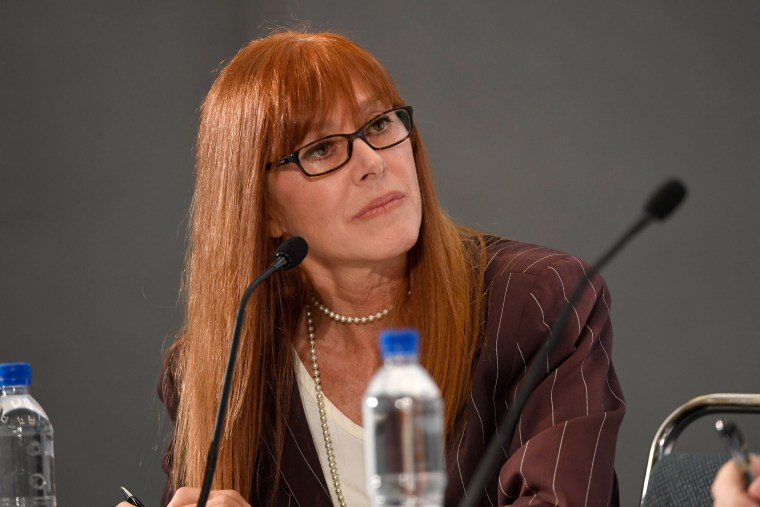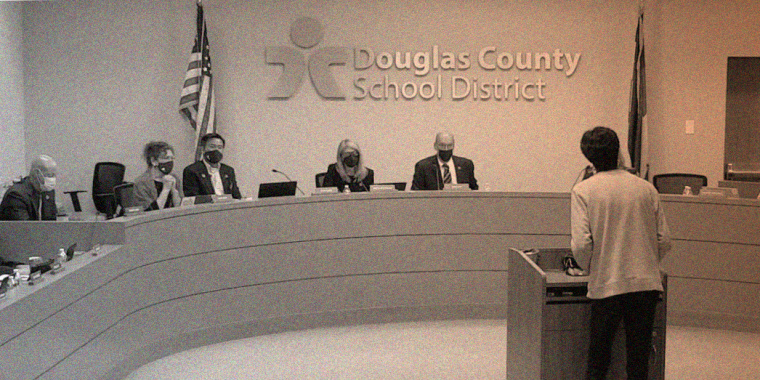School board elections, once mundane and nonpartisan, have grown increasingly contentious across the country as partisan divides in Congress trickle down to even the smallest communities. Few places showcase this better than in Douglas County, Colorado, where recent national debates over race and Covid-19 have turned a hyperlocal race into the war for one school district’s soul.
The race, which has attracted cash from deep-pocketed donors, turned once sleepy school board meetings into heated debates where parents, students and other attendees spend hours arguing over masking policies and the district's equity initiatives.
Just south of Denver, the Douglas County School District, is home to 64,000 students. Its school board election, which wraps on Tuesday, features a slate of four candidates — Mike Peterson, Becky Myers, Kaylee Winegar and Christy Williams — who've branded themselves as the conservative choice in what is a nonpartisan election. On the other side is a similarly structured ticket of four candidates — Krista Holtzmann, Kevin Leung, Juli Watkins and Ruby Martinez — who've banded together in opposition. None of the right-leaning challengers currently sit on the board, while Holtzmann and Leung are incumbents.
"I think I voted once for a school board candidate because I liked the way their name sounded," Holly Osborne Horn, campaign manager for the conservative candidates, told NBC News. "Because I hadn't paid attention. I'm fully awake now.”
“Douglas County, just like so many other places across this country, is kind of a replica of what's happening at a nationwide level,” she explained. “Just as this country is very divided, you find it in your local areas as well. And it's kind of divided over the same issues."
In one of the first election since former President Donald Trump's defeat, local races like this one have energized the conservative movement. At Republican rallies and events across the country, speakers often call on attendees to make sure they vote in their school board races — or run themselves — as they seek to thwart progressive ideas locally and keep voters engaged.
In Douglas County, where Trump defeated President Joe Biden last fall by more than 7 points, this effort could soon bear fruit with a victory that would remake the board's majority and have a long-lasting effect on the community.
The conservative-aligned ticket is backed by the local and state GOP, as well as national groups like the 1776 Project PAC, which opposes anti-racist education. They've also been boosted by a large injection of funding from high-dollar donors, bringing in more than $300,000 and roughly tripling the amount of money raised by their opponents. Much of it has come from a small handful of people, including Eric Garrett, a local real estate executive, Mike Slattery, another local businessman, and R. Stanton Dodge, the chief legal counsel for DraftKings, a sports-betting and fantasy site.
Richard Martyr, the president-elect of the Colorado Association of School Boards, told NBC News that a fundraising haul of that size is “completely atypical” for a school board race.
There have been contentious elections in the county's recent history, but with schools across the country still figuring out how to emerge from the pandemic and becoming intertwined with hot-button issues like masking and anti-racism, locals say this election is taking on a different flavor.
"The race has been difficult from the perspective of hearing so much misinformation in our community," Martinez said. "And I feel like many people in our community are fighting and arguing over some things that don't even exist."
Tensions simmered during a meeting Tuesday evening, hours after a federal judge temporarily blocked an order from the county's new board of health that allowed for people to opt-out of mandatory masking in school, siding with the district.
Attendees accused the board members of being sociopaths and tyrants, adding that if they couldn't handle such criticism they should resign immediately. Arguments broke out between people in the audience. Repeatedly, the board president, David Ray, told the audience not to clap or cheer because, as he said once, that "makes it an unsafe environment for someone who has a different perspective."
One woman spoke while wearing a shirt featuring a mask inside a red circle with a line through it, reading "a masked child is an abused child." Her remarks were later followed by a woman who wore a shirt that read "vaccinated — but still wearing my mask." A female student who spoke said "make no mistake, critical race theory — sorry, equity — is one of the most racist things I have ever heard," while a male counterpart argued for the importance of equity initiatives for students who were not in the straight, white majority.
With multiple points of heated contention between residents and board members, the two incumbent candidates have expressed anxiety about their personal safety. Last week, Leung, one of the two board members up for re-election, filed a police report after he said he faced a racist attack at an election forum.
A rise in threats against school board members, teachers and other staff led the Justice Department to announce earlier this month that it would examine those threats more closely. That memo led Republicans to accuse the Biden administration of trying to silence parents who speak out at board meetings.
Discussions over race in schools have been frequent in Douglas County all year, with diversity and inclusion trainings being conflated with critical race theory — a graduate-level study that examines how racism is embedded in modern institutions.
The district in May pulled out of an agreement with The Gemini Group, a firm hired to put on a two-day equity summit for school staff, following backlash over comments the company’s founders made in an April workshop.
In the April workshop, held over Zoom, Dante and Christina James, spoke about institutional racism and urged teachers to re-examine the narratives traditionally taught in American grade schools.
“Was manifest destiny a great way to conquer the west?” Dante James asked. “Or was it genocide?”
Some parents were outraged over James’ remarks and the conservative school board slate seized on the training as an example of what they describe as wokeness gone too far.

That includes Deborah Flora, a local conservative radio host who now runs the group Parents United America and recently launched a Senate bid challenging Sen. Michael Bennet, D-Colo.
“We want slavery to be taught, we want children to learn about what has happened, and Jim Crow laws and why America went to war with itself to end slavery and all of that,” she said. “This is not what we're talking about when you are telling a child that because of an immutable characteristic, they should be ashamed of that immutable characteristic and that they are oppressors."
Bret Miles, executive director of the Colorado Association of School Executives, defended the program and said it has nothing to do with critical race theory. Their purpose is to tailor educational resources to students' unique circumstances and ensure equal access in the classroom, he said.
“The equity policy has nothing to do with critical race theory. They're, they're two completely different things,” said Watkins, one of the school board candidates running against the conservative slate. “Teaching history as it happens, in even in all of its ugliness, is critical to have people be educated.”
“I think it's a natural human inclination to try to, you know, brush over things that are unflattering,” she added. “But I think we're, we're at that point where it's time to at least acknowledge some of the ugly things that have happened.”

